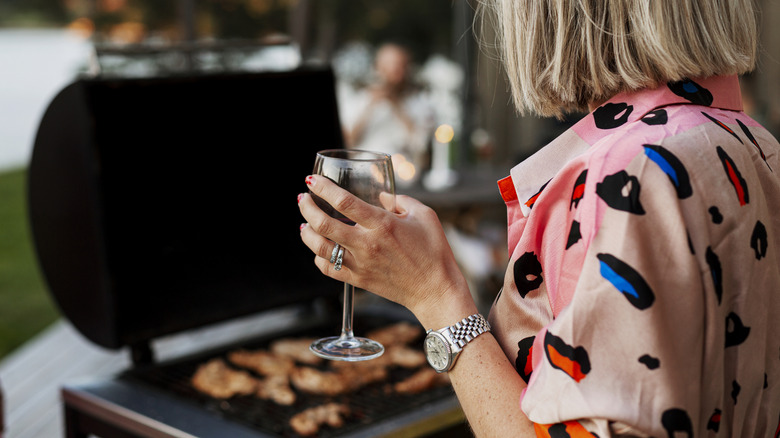Sommelier Tips On Choosing The Right Wine For Your Barbecue
Are you hosting a backyard barbecue soon? Perhaps you've marinated the meat and fired up the grill, but one burning question remains: What drinks should you serve? Of course, beer has long been the go-to beverage for barbecues, but more hosts are turning to wine to complement their smoky meats. And to uncover the right wine for your barbecue, Daily Meal consulted with Andrew Elder, Sommelier at Jônt, a Michelin-starred tasting counter in D.C.
In an exclusive interview, Elder explains that "the type of barbecue is certainly important — with so many different origins and interpretations of barbecue styles and sauces, this has a big impact on the wine selection." This makes complete sense seeing how the United States has a host of regional barbecue styles, from Texas brisket to Memphis ribs. The flavors and textures of the barbecue vary greatly and must be considered when choosing a wine pairing.
When it comes to barbecue, you're often looking at rich and fatty red meats, so Elder recommends keeping acidity in mind, as well as tannic qualities. He also says to "avoid lighter and 'thinner' white wines, such as Sauvignon Blanc or pinot gris — when looking to pair the protein directly." Although he adds that those sippers are great with the typical barbecue sides like potato salad and coleslaw. So which wines should you drink with the meat?
Attributes to consider when pairing wine with your barbecue
Barbecue dishes on the heavy, heartier side need to be balanced with the right amount of acidity. As such, Andrew Elder encourages barbecue hosts to opt for an acidic wine that is "able to cut through the fat and richness of pork or beef barbecue." A zesty German riesling might be the answer for that well-seasoned pulled pork and a lighter Pinot Noir could work well alongside a fatty steak or juicy burger.
Have you ever tasted red wine and picked up on bitter, astringent qualities? Those are the tannins, which are found in grape seeds, skins, and stems. Tannins and heavier barbecue dishes make a wonderful team; the tannins bring out the meat's flavor, while the meat tames the tannins' dryness. With this in mind, it's no surprise that Elder feels that "a well-structured [tannic] red wine is more suited for beefy ribs or brisket."
Elder also encourages you to consider the aromatics of a wine. When you get a good whiff, do you pick up on floral, herbal, or citrus notes? Again, the goal here is to complement and balance the barbecue, not overwhelm it. He says "a 'fruit-bomb' might actually be nice to complement and provide a contrast to smoky and savory flavors." A "fruit-bomb" is a juicy, jammy red wine, typically of the New World style. So take a look for a California Zinfandel or Australian Shiraz with fruit-forward tasting notes like blackberries and strawberries, to balance out the smokier barbecue dishes.

